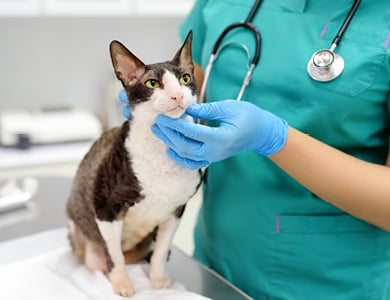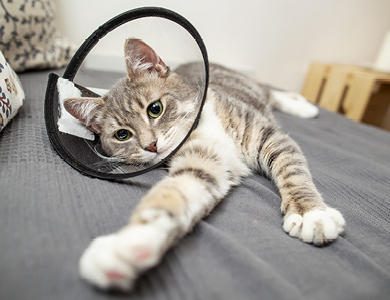Did you know that a single cat can give birth to more than 15 babies in one year? Did you also know that a high number of cats are abandoned every year, or end up in a shelter? It is for these reasons that sterilizing your cat is the responsible thing to do, for both your pet, and society as a whole!

Why is sterilization so important?
First of all, sterilizing your cat helps curb the rampant overpopulation of cats and prevent unwanted mating. If more cats were sterilized, we could put an end to abandonment as well as unfair euthanizing and unhealthy strays.
Secondly, sterilizing your cat helps prevent health problems related to the secretion of sex hormones. For females, sterilization prevents tumors from appearing in the mammary gland. It also helps avoid infections and tumors in the uterus and ovaries which can manifest later in life.
Lastly, sterilization helps avoid certain unwanted behavior. For instance, castrated males tend to be less aggressive, less territorial, less likely to run away, and less likely to mark their territory. Their nocturnal excursions can result in lesions, abscesses or viruses like Leukemia or feline immunodeficiency, which can make your cat sick and even lead to death.
Sterilization also makes cats less likely to meow excessively or run away during periods of heavy heat, which means there will be fewer potential “suitors” on your doorstep.
How it works
For young males, castration is a minor surgery that lasts just a few moments. Sterilization of female cats requires a slightly longer anesthesia while the veterinarian removes the ovaries and uterus completely. This will result in a few small insertions on your cat’s abdomen which will have to be removed 10-14 days later.

Some pointers:
- Set aside a starting budget for basic vaccinations, microchipping and spaying/neutering your new kitten. Many municipalities have made spaying and neutering pets mandatory. However, you should know that many shelters and some cities have spay/neuter programs at a lower cost. Check it out!
- Sterilization is recommended between five and six months in order to decrease the risk of illnesses associated with sex hormones.
- Be sure to feed your cat quality food that promotes optimal growth, and adjust the quantity after surgery as their energy needs will be lower. Weigh your kitten every month to ensure an ideal weight curve and avoid obesity problems.
There you have it: all the reasons why you should sterilize your cat — for their sake, and for the sake of society as a whole! Who knows — sterilizing your cat could mean a full 20 years of blissful companionship!






